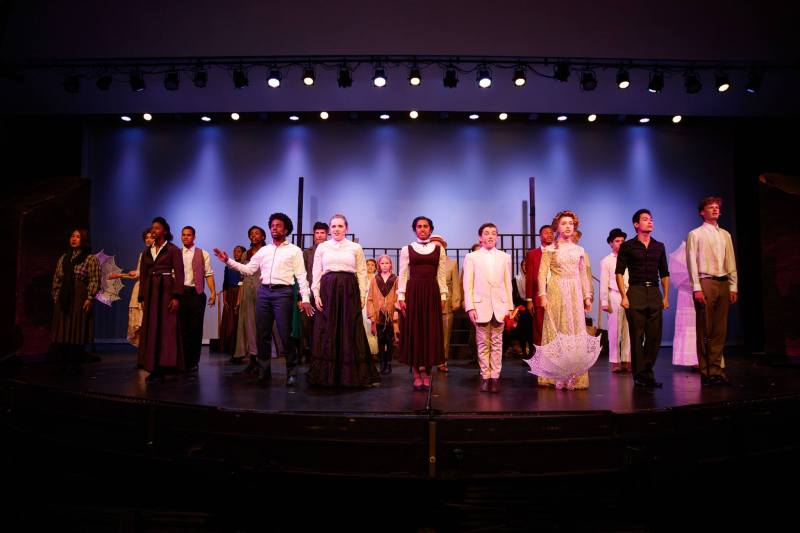“Make Them Hear You,” sings the chorus of the newly-revived BLACKstage production of the musical “Ragtime.” In this musically rich, thought-provoking production, the voices of BLACKstage are heard loud and clear as their wonderfully melodic harmonies crescendo and sharpen to share the pain and strife inherent within the stories of desolate and disenfranchised Americans. These are not easy stories to tell, but the crossover narratives which make up this show — from that of a Jewish immigrant family to a wealthy white upper-class household to a young black couple from Harlem — reverberate powerfully throughout Dinkelspiel Auditorium, providing both a stark criticism of institutional racism and classism as well as a hope for a future of success.
Set in New York at the turn of the 20th century, “Ragtime” uncovers the heated tensions rising within the American melting pot through acts of racial violence and verbal assault. While the characters of this musical come from all walks of life, their stories unite — not unlike the syncopated or ‘ragged’ rhythms of ragtime music — through the obstacles they each face, forming a multidimensional perspective of what it means to be American.
The show itself certainly is a time-specific piece, deeply rooted in the volatile early 1900s. But I would be remiss in not addressing the musical’s timely value, given our contemporary political climate. Issues of discrimination and racial violence are not exclusive to the era of ragtime. As director Nicole Phillips (‘18) said about “Ragtime” in a previous interview with The Stanford Daily, “This could be right now.” The Black Lives Matter movement and the latest Trump-endorsed immigration ban prove that discrimination is very much an issue right now.
With this in mind, BLACKstage’s efforts to bring these exigent social and political issues to the spotlight is not only commendable, it is necessary. In one scene, Coalhouse (Jelani Munroe, alum), a young African American ragtime musician, is cornered by three white supremacists who hurl the N-word epithet at him multiple times just before they trash his car and roll it into a nearby lake. To hear the N-word spoken with such hate — as if the syllables were spit one by one out of the actor’s mouth — is, as an audience member, incredibly jarring. But it is this sort of direct confrontation that challenges us as audience members to really see and really hear the horrifying realities of racism in America. The power of the scene lies in the historical weight of the word, the hateful history which it carries. Reenacting such heinous acts of racial violence stirs public conversation, makes the show realistic and compelling.
Equally jarring is Coalhouse’s transformation from the loving, doting would-be father to the vengeful, spiteful murderer. At the beginning of the show, Munroe performs adeptly as the caring young lover, presenting Sarah (Samantha Williams ‘17) with bright yellow flowers. In “Wheels of a Dream,” Munroe holds his baby close to his chest and looks longingly out to the audience as he recounts his dreams of a brighter future. However, after Coalhouse witnesses Sarah being brutally beaten to death during a campaign rally, he becomes cold and withdrawn, standing with his hands coolly behind his back as he orchestrates bomb threats and violent killings. In his chilling final scene, he surrenders himself to the police, unarmed, with his hands raised in the air. The mere image of Coalhouse’s “hands-up, don’t shoot” gesture is eerily reminiscent of the 2014 shooting of Michael Brown.
Tateh (Miles Petrie ‘19), on the other hand, as a Jewish immigrant, calls upon the audience to consider immigration issues of both past and present. In one scene, a man approaches Tateh and asks to purchase his daughter. In response, Petrie pushes the man to the ground, chases him away and subsequently promises his young daughter that they will have success one day. Tateh’s aspirations to the American dream are not unlike those of immigrants today, who seek both refuge and better opportunities for economic mobility in America.
Confronting us with pressing matters of racial violence, immigration and political suppression, “Ragtime” resounds with powerful social commentary and critique, allowing us to thoughtfully consider our position in the world today. BLACKstage’s production is controversial, but it is so for good reason. In these tumultuous times, theater cannot afford to remain silent or impartial. BLACKstage expertly handles this production with talent, vigor and enthusiasm. The production not only marks the recent revival of BLACKstage as a theater company, but also a revival of hope for a better future.
Contact Alli Cruz at allicruz ‘at’ stanford.edu.
